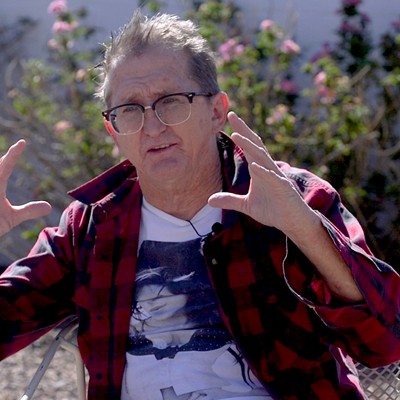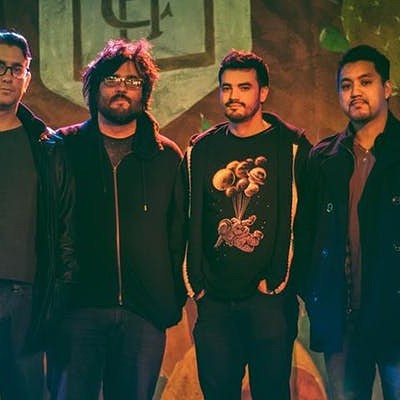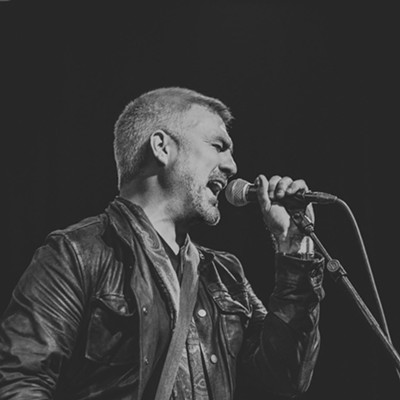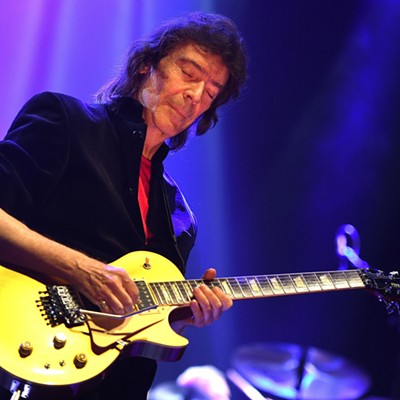The three musicians are among the hardest-working people in show biz these days. Gelb has recently put out a solo album, Confluence, while this week Calexico released a new CD, Even My Sure Things Fall Through. The constant work has all of them juggling tight schedules to keep it all on target.
Giant Sand--Giant Sandworms, actually--began in the early 1980s as a constantly shifting collective of musicians whose one constant was Gelb, who ran the show. It released loads of albums on loads of labels, veering stylistically from one to the next, though there was still a cohesive feel to the ever-expanding body of work. The m.o. was to merely get together with some songs fully written, some not, head into a studio, play 'em and see what would happen. In the '80s, says Gelb, "You were surrounded by music where the drums were way too loud and they spent way too much time on 'em, way too many mics, guitars took a beating, vocals were treated and put way out front. It was fun to go against that and make the records you wanted to hear, 'cause there weren't a whole lot of 'em out there. Lotsa fun, doin' that shit."
The live shows from that era followed suit. Often the band floundered about onstage, looking for some sort of cohesive template to tap into; but just as often, the improvisation lent itself to jaw-dropping attainment of sheer sonic bliss, pure transcendence. To say the shows were hit and miss is an understatement, but there was a palpable sense in the room that anything could happen at any time. "It fell into performance art without having to get naked, or beating yourself up like they always seem to do," Gelb says. "I like when shit goes wrong; I love it when it goes right."
Eventually, though, the lineup stabilized. Drummer Convertino came on board in '88 or '89, followed shortly thereafter by Burns on bass in '91 or '92, and both have been there since. The records began sounding a bit less haphazard, but no less compelling. After almost a decade, Giant Sand had finally become a cohesive unit.
At a certain point, Gelb became slightly uncomfortable with his role as full-time leader. When he was approached by Bill Elm, a multi-instrumentalist who offered to go on tour with the band as a roadie, it seemed a blessing. Eventually Elm would sit in on a significant portion of the sets on tour. "It seemed to really quench my thirst of not having to carry it, just step back and play some piano, let Joey play, 'cause he was learning guitar," says Gelb. "We would do a two-and-a-half, three hour set--in Europe, anyway--and one hour of that is what became the Friends of Dean Martinez. It was really kinda great, really fun."
Eventually the Friends signed a deal with Sub Pop, but when it came time to make the album, Gelb felt he had been shut out of the process almost entirely. "The weird thing was I was brought in to do so little of that record. I think it was the natural force of them--the others--just wanting to do their own thing, or perceived as their own thing or whatever. But it was kind of like a blow. I was like, 'Aw, fuck. I was getting a good kick out of that.' It was like, I'm not needed there ... and that's when the division started to occur, and it was like, 'That's kind of a drag.' But you stay around long enough and you go through seasons and problems and shit." The "division," as Gelb puts it (he also, euphemistically, calls it the "cross of agendas"), would become a recurring sticking point.
Before too long, the Friends imploded in an acrimonious split, and that was that (though the now-Austin-based Friends still exist with Elm as sole original member). The healing process for all came with the invention of OP8, a collaboration that paired the members of Giant Sand with Lisa Germano. "The OP8 record would have been the next Giant Sand record, but we decided to call it OP8 and do this whole different thing where it was like, no seniority, let's all come to the table equally," Gelb says. "And that was really fun because it was a way of everybody working 25 percent instead of anybody working more than anyone."
The OP8 project is what caught the ears of V2, a subsidiary of Virgin Records, which eventually signed Giant Sand to a deal. Around that same time, the seeds of Calexico were being sown as Burns began to write his own songs. "Joey was the instigator, he was really doing his own thing," Gelb says. "He wanted very much to have his own thing." And while Gelb certainly must understand wanting to write and perform one's own songs, it's also clear that he felt a recurrence of the hurt he felt during the Friends experience. "It was weird when they started doing the Calexico thing because Joey had borrowed my guitar and was using my same amp, and I remember one particular bad night. Things were goin' bad and I happened on a gig they were doin' at a little gallery, and it was the exact same set-up John and I had ten years before. Same guitar, same amp, John's same sensibilities and drums. That's when I said, 'Oh. There's a division here. And it's like I'm dead.' And things were taken from the camp that needed taking, just as healthy learnings, and they put their own spin on 'em, their own particular know-how and aesthetics. But then it all came to a head when we did the V2 deal; in order to do the deal, I was the only guy who was saddled with the signing, and they were free to do whatever."
Calexico's rise couldn't have come at a more inopportune time for Gelb. His best friend, soul mate, and frequent musical collaborator, dobro master Rainer Ptacek, was diagnosed with brain cancer. It sent Gelb reeling, and he fell into the depths of an emotional vortex. "Him being sick at that time was not good," Gelb recalls. "Those guys being away was not good 'cause it disallowed us to do music how we always did it before, for better or for worse. And then Rainer died (on November 12, 1997) and we were due to record this record, and two months after that was the first time I couldn't come up with stuff."
The recording of the album intended to be the band's first for V2, Chore of Enchantment, was an arduous process. Gelb was a mess, feeling the pressures of being on a major label, dealing with the sticky emotional residue of Rainer's passing, and having to work around the schedule of his bandmates as Calexico began to take off. In all, the process took a year and-a-half. V2 added salt to Gelb's wounds by rejecting the album and dropping Giant Sand from its roster. Gelb was so despondent that he almost disbanded the group. But eventually the album was picked up by Chicago indie Thrill Jockey; Upon its release last year, the stunning Chore of Enchantment attracted more attention, both in the press and commercially, than any of Giant Sand's releases in the previous 20 years.
At the same time, Calexico's Hot Rail (Quarterstick, 2000) garnered them deserved equal praise, and these days the duo seemingly spends as much time on the road as they do in Tucson. As such, Gelb has turned to solo projects to fill the gaps, mostly because he feels like he finally can. "All the years, the past, I was overly concerned about the band as a unit having to survive and eat and flourish," he says. "And the idea of doing a solo record meant that ... what are those guys gonna do? There was no real point."
As if to make up for lost time, Gelb has just released a delightfully unhinged solo record, Confluence, on Thrill Jockey; he's got a solo instrumental piano album coming out on his own Ow Om imprint in August; and Giant Sand is currently finishing up recording the follow-up--if you can call it that--to Chore. Confounding all expectations once again, it's an album of cover songs. "It's gonna be exactly what Chore isn't: light and lacking of atmosphere, kinda fun," Gelb says. "It's gonna be a whole different mineral. Chore was an animal. It's the way we used to do it, two weeks maybe, maybe three ... As good as Chore is, I never have to make another record like it again. And I don't want to."
Calexico has also just released an EP, Even My Sure Things Fall Through (Quarterstick), which includes import b-sides (including two versions of "Crystal Frontier," a track that ranks among the band's best), remixes and a trio of videos. Following a performance this weekend, Calexico embarks on a tour--first the U.S., then Europe--which will take Burns and Convertino through mid-July. Following Gelb's solo performance on the previous night, he'll take to the road for a string of dates in the States through June. Fittingly, they will nearly cross paths on a few occasions.









